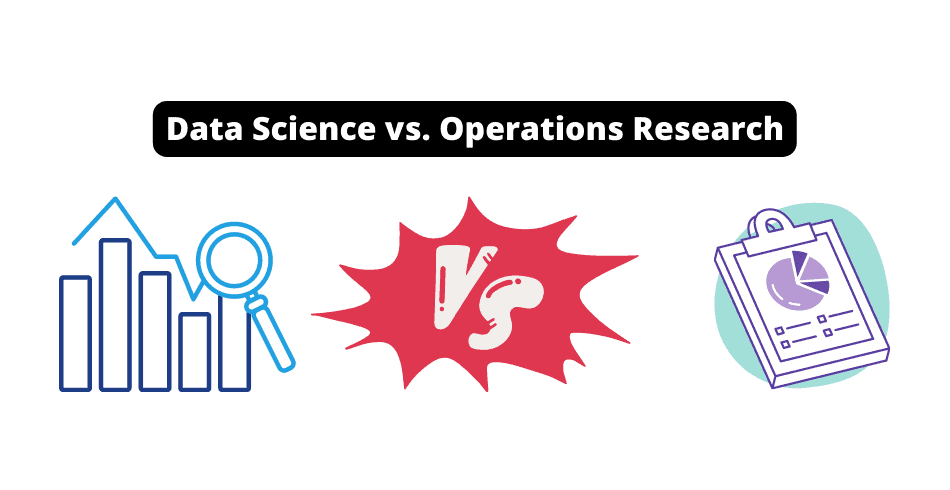When it comes to data science and operations research, you probably think they are the same thing – and for a good reason.
These two share a ton of similarities.
While they share these similarities, they differ in terms of purpose, technique, and application.
Data science is a relatively new field (compared to OR) that focuses on discovering insights from data (hence the name).
The technology behind it involves developing algorithms and models based on large datasets.
Operations research, which has been around for longer, uses mathematical techniques to solve complex problems dealing with decision-making processes.
Both fields involve optimization and require particular technical know-how, but understanding their subtle differences can help determine which path is correct for YOU.

What is Data Science And Operations Research?
As I said above, Data Science and Operations Research have much more in common than they have differences.
The problem with that – is the differences they do have – aren’t subtle.
Hang on tight as we break this down a little more in-depth.
Data Science vs. Operations Research
Data science and operations research are two career paths with a lot in common, but the most significant difference lies in their approaches to problem-solving.
Operations research generally relies on the accumulation of expertise and intuition to create advanced systems, while data science puts its trust squarely in the data.

Users may not know how an algorithm arrives at its answers, but that’s part of what makes data science…data science.
These techniques can crunch millions or even billions of variables to find patterns and solutions that human observers would never have a chance to notice.
The intersection between these two disciplines creates a powerful new way of looking at complex problems.
Data Science and Operations Research Need Different Skills
Another critical difference between these professions is the engineering aspect – while both OR and data science professionals need strong problem-solving skills, data scientists must also be equipped with excellent data engineering skills since they rely so heavily on data.
And trust me, this discipline is challenging to learn – understanding how to correctly move data from one place to another in a repeatable way is a skill just like anything else.

While data scientists have the edge in data, OR professionals will have the edge in creativity.
OR professionals put their knowledge of operations into practice to solve problems such as maximizing efficiency or driving down costs – sometimes without data.
This is where their skillset shines – their general creativity and imagination are some things data scientists lack.
If the data doesn’t agree, a data scientist doesn’t agree.
Each profession requires a slightly different skill set; remember these subtle differences when making your choice. (creativity vs. engineering)
While we’ve gone over many differences between data science and operations research, and it may appear that these are two distinct disciplines at first glance, the truth is that they share many common practices, techniques, and skills.
From a quantitative and qualitative lens, the practitioners of these fields rely on the same methods — such as analytics, optimization models, simulations, and statistical modeling – to extract meaningful information from data sets and other forms of information.
Even though the objectives of their work may vary slightly, including different approaches to data analysis and interpretation tailored to specific industries or projects, they are both striving towards solutions to organizational challenges and long-term prosperity.
By harnessing unimaginable technology only a few decades ago, professionals of both disciplines have been offered new tools to delve deeper into real-world scenarios and develop creative solutions that can improve our daily lives.
Data Science is Operations Research
While we know now the similarities and slight differences between Operations research and Data science, how did these two become two separate disciplines?
Operations research has been around forever, while data science has come out of nowhere in the last 20 years.
Why is that?
The answer has nothing to do with these disciplines and more to do with technology.
In the last 20 years, we’ve seen an explosion in the volume of data.
More data is being collected and processed than ever before.

To truly grasp how much more data we’re creating and collecting each year, Forbes.com has found that 90% of all data created is created within the last two years.
This isn’t because we just started creating data; we make and collect so much more the next year than the year before.
So while it may seem like data science came from nowhere, data science is an answer to the problems that sprung up from above – we just have so much data.
This shows us why the split between Operations research and Data science is truly about the data since data science is a subset of operations research explicitly created to handle this monstrous increase in data.
If Data Science Originated From Operations Research, Where Did Operations Research Come From?
Operations research, like many technological advances, began during the first world war.
In February 1917, German U-Boats were sinking a ton of British ships in the Atlantic.

To put this into perspective, they sank 1 in 10 ships each month.
Knowing that something had to be done, British scientists created a model to help the convoy survive their trips. They optimized size, speed, timings, and routes to enable these ships to reach their destination.
Within six months, losses were down to 1 in 200 ships each month.
While the war eventually ended – the idea of applying math to solve problems stayed around.
See More In This Video Here:
In Operations Research, Do They Use machine learning?
Operations Research does use machine learning. While they don’t use it nearly as much as data scientists and machine learning engineers, Sometimes machines can find hidden patterns in data that are hidden from the natural eye – and operations research professionals take advantage of this.

As we said earlier, Data science is a subset of operations research – which means those skills can be inherited by operations research.
Don’t be shocked if some operations research professionals are highly skilled in handling data, programming, statistics, and optimizing machine learning algorithms.
The difference is that this isn’t their main priority, and they have a much more comprehensive range of skills than a data scientist – who has a deeper understanding of data and machine learning.
Is Operations Research still relevant?
Operations research is still relevant and plays a valuable role in the world. In recent years, the use of data and technology has become more commonplace.
Companies rely on these technologies’ insights to help them make decisions and become more efficient.
This is where operations research comes in – creating better decision-making models, measuring risk, and providing optimization strategies.
If you recognize data science as part of operations research, it’s easy to see how OR will always remain relevant!
We need intelligent methods and effective systems to help us navigate through complex problems; operations research continues to provide such solutions.

What are the real-life applications of operations research?
Operations research is everywhere – here are a few to give you a general idea:
1. Logistics and supply chain management
2. Planning and scheduling of production processes
3. Production planning, inventory control, and resource allocation
4. Financial portfolio optimization
5. Risk analysis in decision making
6. Airline route network optimization
7. Healthcare operations improvement
8. Maintenance scheduling for machinery
9. Traffic flow management
10 Network design
Operations Research vs. Data Science Salary
While I spent a lot of time in this article trying to show you how similar these two disciplines are, they aren’t so similar in pay.
According to glassdoor, a data scientist brings in, on average, about $125,000 a year.

Comparing that to careers in operations research, where the salary on average is $90,000.
While this is tough to hear for our operations research lovers, data scientists are in huge demand at the moment, and every company seems to be hiring them.
This demand drives up the price – and as we see – it’s not close.
References:
https://www.glassdoor.com/Salaries/data-scientist-salary-SRCH_KO0,14.htm
https://www.glassdoor.com/Salaries/operations-research-analyst-salary-SRCH_KO0,27.htm
Other This Or That Articles
We’ve written a couple of other articles that are very similar to this one; check out:
- Machine Learning vs. Automation:
- Full Stack Developer vs. Machine Learning Engineer
- Data Science vs. Economics
- Machine Learning vs. Programming
- Machine Learning vs. Human Learning
- Heuristic Algorithm vs. Machine Learning
- Data Science vs. Bioinformatics
- Do Managers Earn More Than Software Developers? [Find Out Now] - February 13, 2026
- Deploy Applications in Data Science on Heroku [Boost Your Skills Now] - February 13, 2026
- Mastering the Algorithm for Neural Network [Unlock the Power!] - February 12, 2026

